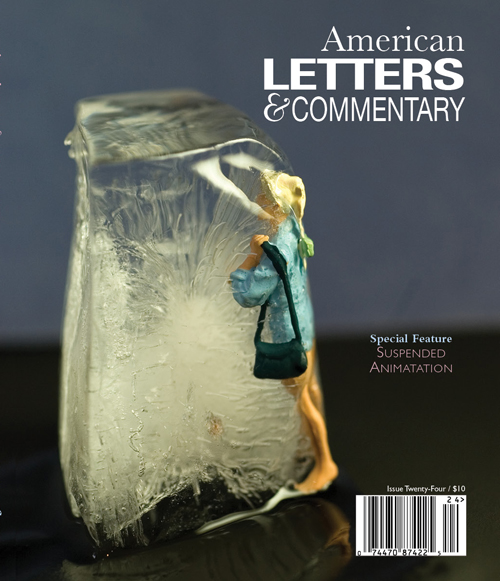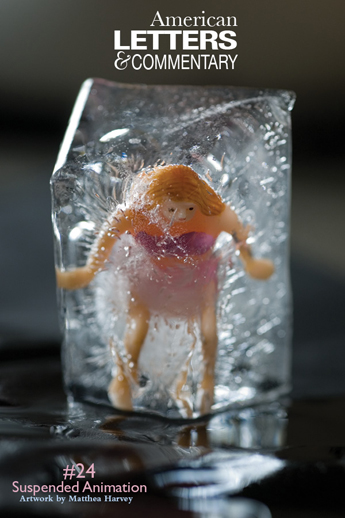
Co-Editors
David Ray VanceCatherine Kasper
Editor Emeritus
Anna Rabinowitz
Cover Art
Brian Dettmer
Layout Assistant
Emily Broadwater
Special Feature
Suspended AnimationArtwork:
Matthea HarveyPoetry & Prose:
Kristin Abraham • Kismet Al-Hussaini • Steve Barbaro • Deborah Bernhardt • Simeon Berry • Amaranth Borsuk • Yosa Buson • Marci Calabretta • J'lyn Chapman • Ryan Collins • Stephen Danos • Jesse DeLong • Richard Deming • Laressa Dickey • Jenny Drai • Eugene Dubnov • Amy England • John Fry • Dan Gutstein• Rebekah Hall • Cynthia Hogue • Valerie Hsiung • Allison Hutchcraft • Sally Keith • L.S. Klatt • Benjamin Landry • Meghan Lee • David McAleavey
• Kyle McCord • Joshua McKinney• Kevin McLellan • Jennifer Moore • Frances PostMatt Reeck • Ryann Wahl • Elisabeth Whitehead • Kathleen Winter


We begin this issue with Matthea Harvey’s captivating photographs of miniatures suspended in ice, followed by what we think is a compelling selection of poems, short stories, translations, and book reviews. Conceptually, we like the idea of extending the frozen miniature imagery in Harvey’s photographs to the frozen landscape of Frances Post’s “Self-Portrait in Antarctica,” and J’Lyn Chapman’s “A Poetics Of Absolute Time and Space,” which examines the power of W.G. Sebald’s work (a writer who was also fascinated with miniatures). Of course, to some extent, every poem or story is a miniature of each individual’s world vision suspended on the page. And given Suspended Animation refers to “the slowing of life processes by external means without termination,” we hope each work continues to live with your reading.
Not coincidentally, the idea of suspended animation also speaks to our plans for this journal. As you may already know, AL&C has branched out into book publishing in the last few years. Our catalog includes Frank Rogaczewski’s The Fate of Humanity in Verse, a collection of prose-poem-essays, and Amy England’s For the Reckless Sleeper, a full-color text-image work focused on dreams, both available on our website and through Amazon. After much deliberation, we’ve decided to focus our efforts in this direction. Because AL&C exists entirely on volunteer efforts, this requires shifting resources, and so we will be putting the annual journal “on ice” for a while. Back issues will continue to be available through our website, as will updates on the book press, but we will not be accepting journal submissions for the foreseeable future. We also aren’t prepared to accept unsolicited book manuscripts just yet, but please stay tuned.
In the meantime, we would like to thank the readers, contributors, former editors, volunteers, and donors who have made this journal possible for the last 24 years, and we hope you will continue to lend us your support as we focus our efforts on publishing books that uphold AL&C’s long tradition of promoting innovative and “difficult” writing.Catherine Kasper and David Ray Vance
(2013)